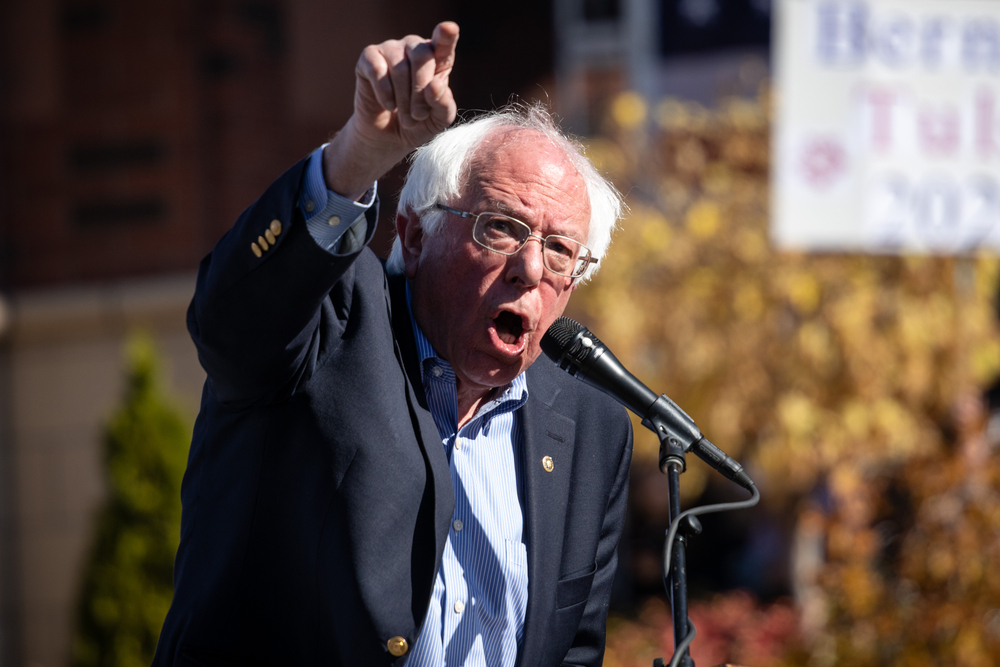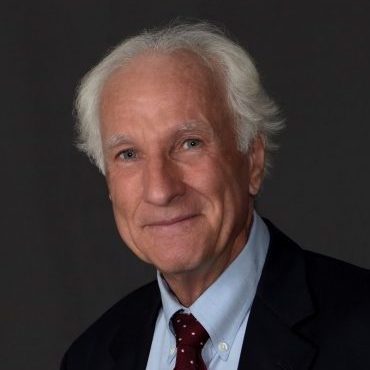“If the definition of insanity is doing the same thing over and over again while expecting a different outcome, the Sanders’ amendment is a classic case of Washington policy psychosis.”
 Rattled by the failure of the Biden Administration to bow to pressure to misuse the march-in rights provision of the Bayh-Dole Act so the government can regulate prices on products based on federally funded inventions, Senator Bernie Sanders (I-VT) and his allies are doubling down. And the impact of National Institutes of Health (NIH)-supported research is now in jeopardy.
Rattled by the failure of the Biden Administration to bow to pressure to misuse the march-in rights provision of the Bayh-Dole Act so the government can regulate prices on products based on federally funded inventions, Senator Bernie Sanders (I-VT) and his allies are doubling down. And the impact of National Institutes of Health (NIH)-supported research is now in jeopardy.
Sanders taunted the Administration, pledging to hold up the nomination of Dr. Monica Bertagnolli to head the NIH until President Biden submits to his demands to do more to control drug prices, including requiring that any therapy-based on an invention arising from NIH funding must be sold at a “reasonable price.” Anyone who was in the Senate as long as Joe Biden knows the fate of Presidents who are successfully bullied by Members of Congress.
As STAT reported:
“Sen. Bernie Sanders’ rare move to delay President Biden’s health care nominees has put the drug pricing firebrand and the White House in a standoff — and public health advocates worry the feud could squeeze out an otherwise uncontroversial pick to lead the country’s top science agency.”
Over the Cliff
Now, Sanders wants to attach a “reasonable pricing” amendment to the pending reauthorization of the Pandemic and All-Hazards Preparedness Act, which will be voted on in the Senate Health, Education, Labor and Pensions Committee, which Sanders chairs, this Thursday, July 20.
The tragedy is that we’ve been down this road before—and it goes over a cliff. Bowing to similar political pressures in 1989, NIH required industry partners in their Cooperative R&D Agreements (CRADAs) or those exclusively licensing NIH owned inventions to pledge to sell resulting products at a reasonable price. But rather than leading to cheaper drugs as the advocates predicted, something quite different happened. Industry walked away. Apparently, Sanders thinks that if he repeats the experiment with an even broader scope this time, the outcome will be different. So, rather than being limited to CRADAs and licenses of NIH-owned inventions as before, his amendment also applies to academic research institutions receiving NIH support
Sanders and his allies believe that companies commercializing federally funded inventions are getting a special benefit. They seem to assume that because public/private sector partnerships have flourished under the Bayh-Dole Act, industry is over a barrel, so they can now force companies to dance to their tune. Since they oppose Bayh-Dole, they don’t understand how our system works.
Why it Won’t Work
Under the Bayh-Dole Act, companies must assume considerable risk and expense to transform early-stage federally funded inventions into useful products. That journey is particularly daunting with drug development, where more than 80% of potential medicines entering clinical development fail, with those costs borne by the private sector. When projects collapse, companies take the hit.
Our system is driven by small entrepreneurial companies which must secure a long series of investments to bring a drug to market. These entrepreneurs can’t be expected to make a binding legal commitment to NIH based on an undefined concept such as “reasonable pricing” for a product that doesn’t even exist yet. So, potential industry partners declined to sign CRADAs or exclusive licenses. It didn’t take long for NIH to realize they had a disaster on their hands.
As the number of CRADAs collapsed, NIH convened a series of public meetings where not only companies, but NIH’s own researchers, reported the damage being inflicted because of the “reasonable pricing” provision. NIH obtained advice from its Directors’ Advisory Committee, the Public Health Service Technology Transfer Policy Board and the NIH Technology Transfer Advisory Committee.
NIH reported:
“All three of these groups concluded that the clauses should not be permitted to impair NIH’s ability to do collaborative research to improve public health. Further, these committees found that the NIH lacked the requisite legislative mandate or expertise to regulate prices and that such a role would conflict with its technology transfer mission.”
Finally, on April 11, 1995, then NIH Director Harold Varmus announced the removal of the “reasonable pricing” clause, stating :
“An extensive review of this matter over the past year indicated that the pricing clause has driven industry away from potentially beneficial scientific collaborations with PHS (public health service) scientists without providing an offsetting benefit to the public. Eliminating the clause will promote research that can enhance the health of the American people.”
He added:
“The clause attempts to address the rare breakthrough product at the expense of a more open research environment and more vigorous scientific collaborations. One has to have a product to price before one can worry about how to price it, and this clause is a restraint on the new product development that the public identified as an important return on their research investment.”
NIH showed the damage went beyond just CRADAs and licenses:
“The ‘reasonable pricing’ clause, however, discourages the execution of exclusive licenses and CRADAs and inhibits the ability of PHS scientists to obtain access to research materials and scientific expertise from their private sector counterparts, even outside the context of a license or a CRADA.”
Shortly thereafter, CRADAs with NIH showed an incredible rebound. But the story doesn’t end there. Rather than admit their theory had been tried and failed, it was alleged that the problem was that NIH didn’t know how to count its own agreements. In response, under the Biden Administration, NIH issued a paper accompanied by graphs rebutting that assertion
‘Washington Policy Psychosis’
If the definition of insanity is doing the same thing over and over again while expecting a different outcome, the Sanders’ amendment is a classic case of Washington policy psychosis. But this is no joke. If this amendment were ever implemented, critically needed therapies would remain on the shelf, exactly as happened before Bayh-Dole. That means many people praying for relief from disease will needlessly suffer without doing anything to bring down health care costs.
We can’t afford to run this failed experiment again. Let’s hope that the members of the Senate HELP Committee get a wake-up call before Thursday’s vote. If not, fasten your seat belts. Things are about to get a lot worse.
Image Source: Deposit Photos
Image ID: 222039816
Author: TPOphoto

![[IPWatchdog Logo]](https://ipwatchdog.com/wp-content/themes/IPWatchdog%20-%202023/assets/images/temp/logo-small@2x.png)

![[Advertisement]](https://ipwatchdog.com/wp-content/uploads/2024/04/UnitedLex-May-2-2024-sidebar-700x500-1.jpg)
![[Advertisement]](https://ipwatchdog.com/wp-content/uploads/2024/04/Artificial-Intelligence-2024-REPLAY-sidebar-700x500-corrected.jpg)
![[Advertisement]](https://ipwatchdog.com/wp-content/uploads/2024/04/Patent-Litigation-Masters-2024-sidebar-700x500-1.jpg)

![[Advertisement]](https://ipwatchdog.com/wp-content/uploads/2021/12/WEBINAR-336-x-280-px.png)
![[Advertisement]](https://ipwatchdog.com/wp-content/uploads/2021/12/2021-Patent-Practice-on-Demand-recorded-Feb-2021-336-x-280.jpg)
![[Advertisement]](https://ipwatchdog.com/wp-content/uploads/2021/12/Ad-4-The-Invent-Patent-System™.png)






Join the Discussion
4 comments so far.
Anon
July 18, 2023 06:21 pmI would dare say that “can” is NOT the operative word to be used, my long-monikered friend.
Innovation can go hand-in-hand with care and compassion
July 18, 2023 07:25 amEdited:
“If the definition of insanity is doing the same thing over and over again while expecting a different outcome, not passing the Sanders’ amendment is a classic case of Washington policy psychosis.”
Anon
July 17, 2023 05:15 pmPlease explain why “reasonable pricing” simply cannot take ALL of the existing risk into account for developing the definition of “reasonable.”
Unless that definition has already been crafted — and is eminently UNreasonable (no small thing given the prevalence of 1984s abounding in today’s politics), then this could be an eminently easy thing to comply with.
Pro Say
July 17, 2023 04:45 pmWonder how many NIH-supported breakthrough drugs are keeping Bernie “Gurney” Sanders alive today?
Drugs that, were they never created . . .